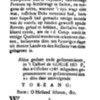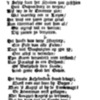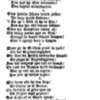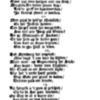Toe-zang: Wat tyding komt van de Kaep, / In Amsteldam te voren
Title
Synopsis
Digital Object
Image notice
Image / Audio Credit
Set to tune of...
Transcription
1.
Wat tyding komt van de Kaep,
In Amsteldam te voren:
Van menig Goddelooze knaep;
Als u dit Lied doet hooren.
Op Duynenburg is het geschied,
Als u vermelden gaet dit Lied,
Daer veele Muytelingen,
Verkeerde wegen gingen.
2.
't Schip daer het Muyten zou geschien
Heet Duynenburg in deezen,
Als wy in de Zententie zien:
Wel waerdig om te Leezen,
Het was een zaem gerot getal
Van tweemael elve met hun al,
Die tegens wil en wetten:
Zig zamen zo verzetten.
3
Het hoof van deeze Muytery;
Een Fielt van alle Fielen,
Zogt veel Booswigten op zyn zy
Om alles te vernielen,
Zyn Naem verander met terstond,
Van Paradys in een Helhond:
Of Beelzebub dien snoode;
Kend geene God der Goden.
4.
Het kwade Schelmstuk snood bedagt;
Moest men niet doen by Dagen,
Maer 's Nagts al by de Rondewagt?
De Stuurman eerst geslagen;
Met Knuppel-Kogels zo verwoed;
Dat hy dood viel op staende voet,
En voorts aen 't massacreeren,
Die hem niet kon verweeren.
5.
ô Menschen hoor, ik eys, ik eys,
Als ik de tael kom lezen,
Van dezen Booswigt Paradys:
Een Atheist in deezen,
In schelmeryen opgegroeyt:
En een Conscientie toegeschroeyt:
Zoo had hy God verlooren?
Den duyvel uitverkooren.
6.
Dien helsche Pharo wierd gestut:
In deeze quade stukken,
't Sy op 't Dek of by de Huc,
Soo dat het niet kwam lukken:
Twee der Cimplicen vielen af,
Wy willig zonder pyn en straf,
Terwyl de worm kwam knagen,
Om 't opregt voor te dragen.
7.
Maer zie de Godheid groot in daed,
En vol Regtvaerdigheden,
Die stuit dit Helsch vervloekte kwaed:
En grypt de Argelistigheden
Soo dat volgens zyn tael en woord,
De raed der Boozen werd verstoord?
Dat zy niet uit en regten,
Hoe zeer zy willen vegten.
8.
Met vatze alle by den Kop,
En sluytze in de Keeten:
En brengtze al gevangen op:
De Regter wys gezeten!
Aen Cabo of de Goede Hoop,
En maekt van drie hun Levensloop?
Een eind hoe zeer zy wroeten?
Met stroppen en Koevoeten.
9
De Regter die 'k wys erken,
Den eerste deed Ledebraken,
Syn hooft gekapt voorts op een pen,
Als Straf van zulke zaken,
Twee zag men hangen aan een strop,
Moordmessen boven hunne kop
And're geess'len brandmerken,
In Ketens zwaer te werken.
10
Men prys de heil'ge Majesteid,
En het Justitie houden,
Een spiegel diend het voorgeleid;
Soo wel aen Jong als Ouden?
Het zy Matroozen of Soldaet,
En wie hem op de hielen gaet,
Van baer en strom begeven,
Om in zyn Post te leven.
11.
Had Nyenburg dat ongeluk:
Men dagd 't zou daer by blyven,
Maer neen, op Duynenburg het Stuk:
Nog bozer, komt men schryven:
Uit Crand en uit Sententie blykt:
Dat het 't eerste haest geleikt,
Dog Godt zeer groot in daden,
Beletten zulk een kwade,
12.
Ag spiegeld u 't geen is geschied,
Gy die de See gaet bouwen,
Op God in al u varen ziet:
Soo blyft gy wis behouwen,
En ga geen slinkze wegen in,
Leeft als de Bey niet als de Spin,
En zoek het zoet te lezen:
Dan word gy steeds geprezen.
What tidings come from the Cape,
To the fore in Amsterdam:
Of many a Godless young man;
If you listen to this song.
Upon Duynenburg it happened,
Like it will be stated in this song,
There many mutineers,
Went the wrong way.
The ship upon which the mutiny would happen
This is called Duynenburg,
As we see in the sentencing:
Well worth it to read,
It was a great number
Of two times eleven altogether,
Who against will and laws:
Together thus resisted.
The head of this mutiny;
A rogue of all rogues,
Sought many villains by his side
To destroy everything,
His name changed instantly
From Paradise into a Hellhound:
Or Beelzebub, that evil one;
Knows no God of Gods.
The evil roguery insidiously concocted;
They must not do it by day,
But at night during the patrol?
The skipper first beaten;
With cudgels so furiously;
That he fell dead immediately,
And forthwith massacre,
Whoever could not defend himself.
Oh people hear, I demand, I demand,
When I come to read the language,
Of this villain’s Paradise:
This is an atheist,
Raised in rogueries:
And a singed conscience:
So he had lost God?
Chosen the devil.
That hellish Pharaoh was stopped:
In these evil pieces,
It be on deck or by the hut,
So that it did not succeed:
Two of the simpletons dropped out
Voluntarily without pain and punishment,
Whilst the worm came to gnaw,
To propose it sincerely.
But see the deity great in deeds,
And full of Justices,
Who stops this hellish, cursed evil:
And takes the evil predisposition
So that according to his language and word,
The council of the evil was disrupted?
That they could not perform,
How much they want to fight.
They were all taken by the head,
And locked in chains:
And took them captured:
The judge had been wise!
In Cabo or the Good Hope,
And make from three the life cycles?
An end however much they grub?
With nooses and crowbars.
The judge whom I acknowledge wisely,
The first ordered his limbs to be broken,
His head cut and put upon a spike,
As punishment for such actions,
Two people saw hang by the noose,
Murder-knives above their heads
Others tortured, branded,
To work in heavy chains.
People praise the holy Majesty,
And maintaining justice,
A mirror has been presented;
Both to young and old?
Be they sailors or soldier,
And who would follow in his footsteps,
Forsaken by salvation and greatness,
To live in his post.
Nyenburg had that misfortune:
People thought that would be the end of it,
But no, upon Duynenburg the piece:
Even more evil, people came to write:
From newspaper and from the sentence appears:
That it almost mirrors the first,
Though God, very great in deeds,
Prevented such an evil,
Oh reflect upon what has happened,
You who will go to sea,
Build upon God in all your voyages:
So you will remain wise,
And will not go into devious ways,
Live like the bee not like the spider,
And seek the sweet reading:
Then you will be continuously praised.
Translation by Rena Bood
Date
Notes
1. ‘op de hielen gaan’ is a Dutch saying meaning ‘following your footsteps’ "




